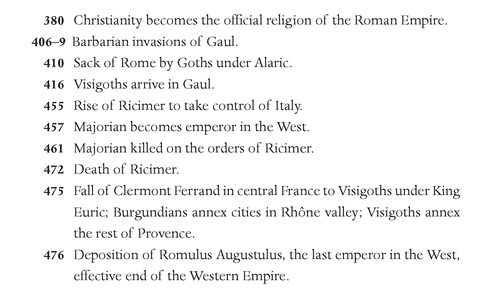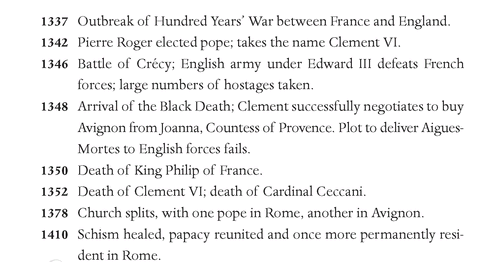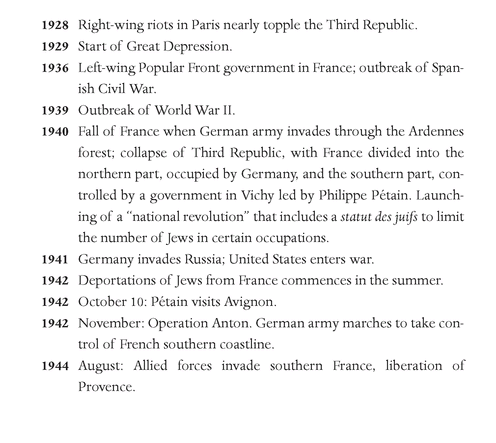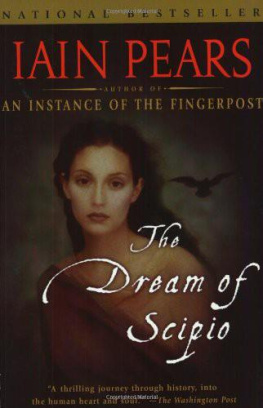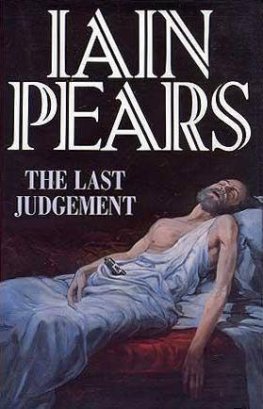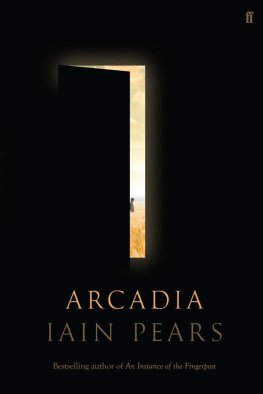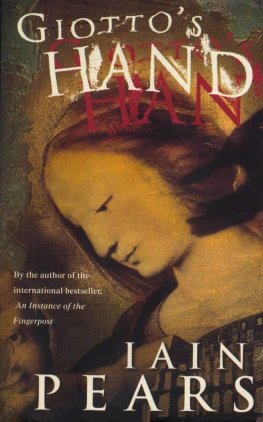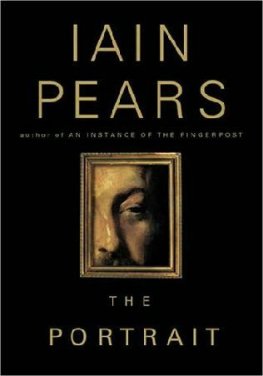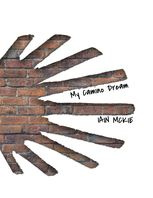ACKNOWLEDGMENTS
With thanks to Felicity Bryan, Mih-Ho Cha, Eric Christiansen, Catherine Crawford, Dan Franklin, Robert Gildea, Julie Grau, Lyndal Roper, Georges-Michel Sarotte, Lucinda Stevens, Nick Stargardt and once again, Ruth Harris.
ABOUT THE AUTHOR
IAIN PEARS was born in 1955. Educated at Wadham College, Oxford, he has worked as a journalist, an art historian, and a television consultant in England, France, Italy, and the United States. He is the author of seven highly praised detective novels, a book of art history, and countless articles on artistic, financial, and historical subjects, as well as the international bestseller An Instance of the Fingerpost. He lives in Oxford, England.
CHRONOLOGY
Mid fourth century AD Roman Empire divided into an Eastern Empire, based on Constantinople, and a Western Empire, based on Rome.
PART ONE
JULIEN BARNEUVE died at 3:28 on the afternoon of August 18, 1943. It had taken him twenty-three minutes exactly to die, the time between the fire starting and his last breath being sucked into his scorched lungs. He had not known his life was going to end that day, although he suspected it might happen.
It was a brutal fire, which took hold swiftly and spread rapidly. From the moment it started Julien knew it would never be brought under control, that he would be consumed along with everything around. He didnt struggle, didnt try to escape; it could not be done.
The fire ravaged the househis mothers old house, where he had always felt most at ease, and where he always thought he had done his best work. He couldnt blame those nearby; any sort of rescue would have been foolhardy. Besides, he wanted no assistance and was content with the privacy they had granted him. Eight minutes between the fire starting and his collapsing into unconsciousness from the smoke. Another three minutes before the fire reached him and began to make his clothes smoke and skin bubble. Twenty-three minutes in all until his heart gave out, his breath stopped. Another hour until the fire finally burned itself out and the last charred rafters crashed to the floor over his body. But to Barneuve, as his thoughts broke into pieces and he stopped trying to hold them together, it seemed to have taken very much longer than that.
IN SOME WAYS, his fate was sealed the moment Olivier de Noyen first cast eyes on the woman he was to immortalize in his poems by the church of Saint Agricole a few hundred meters from the Popes new palace in Avignon. Olivier was twenty-six, having been fated to live and die in what was possibly the darkest century in European history, an age men called cursed, and which drove many all but insane with despair at Gods vengeance for their sins. Olivier, it was said, was one such.
Isabelle de Frjus had just turned sixteen and had been a wife for seven months, but was not yet pregnant, a fact that was already causing old women to gossip knowingly, and to make her husband angry. For her own part she was not displeased, as she was in no great rush to embark on the great gamble that left so many women dead or permanently afflicted. She had seen in her mother the terrible damage caused by her own birth, so swiftly followed by another and another, and was afraid. She did her duty by her husband, and prayed every night (after she had taken such precautionary measures as she knew) that her husbands assaults would prove fruitless for a while longer. Every second day she went to church to beg forgiveness for her unruly, rebellious wishes, and at the same time to place herself at the disposition of the Virgin in the hope that Her mercy and forbearance would endure a while longer.
The effort involved in this celestial balancing act required such concentration that she left the church in a haze of thought, her brow furrowed and showing off a little wrinkle just above her nose. Her veil was ever so slightly disarranged, as she had pushed it back a little when she knelt down to pray. Her maid, Marie, would ordinarily have reminded her of this small lapse, but knew her mistress well, and knew too what was going through her mind. It had been Marie, in fact, who had taught her those little tricks that were helping to make Isabelles husband so increasingly concerned.
A small wrinkle and a veil askew were perhaps enough to inspire a painter, but not in themselves sufficient to have such a devastating effect on a mans soul, so some other explanation must be sought. For Olivier, standing nearby, felt as though some immensely powerful beast had torn at his breast, sucking the very life from him. He gasped in shock, but fortunately no one heard him. So intense was the sentiment, that he had to sit down on the steps and remain there, staring long after the receding form had disappeared from view. And when he stood up, his legs shaking, his brow damp with sweat even though it was still morning and not yet hot, he knew that his life had changed forever. He did no work for days.
Thus began a tale of the doomed love between a poet and a young girl that was to lead to such a calamitous and cruel ending.
PERHAPS IT was her youthful beauty? Julien Barneuve thought so, at least when he first read the account of this fateful encounter, elaborated through the years and finally set down with all the romance that hindsight can offer around 1480, nearly a century and a half later. The pedigree of the anecdote was always suspect, seeming too close to Petrarchs encounter with his Laura to be comfortable. But it had tradition behind it, as well as one of Oliviers finest verses, the ten-line poem that begins (in the wholly inadequate 1865 translation of Frdric Mistral), My eyes have stabbed my soul... And the essence was surely true, for Oliviers dreadful fate a few years later when he fell into the hands of Isabelles husband could not be contradicted. If he had not loved her, why would he have killed her and been attacked himself in such a way?
For Olivier was tainted with madness, it seemed; the story recounted how the girl had wished to go with her husband to flee the plague and the poet begged her to stay in Avignon, that they might die in each others arms. And when she refused, he killed her, unable to let her go. The deed revealed his secret, and he was set upon by the Comte de Frjuss hirelings in revenge, beaten, and his tongue and hands cut off. Olivier was, quite literally, silenced, his voice forever quieted. He could no longer talk, write, or even make signs so that others could understand him well. More still, the outraged and humiliated husband had destroyed all but a few of his poems. No one could now tell whether his poetry, for which he was beginning to become known, was indeed the first flowering of a literary Renaissance, the model beside which Petrarch ranked a lowly second, or merely appeared so to those few who had read his work during his life. Only a dozen or so remained, not enough to captivate a man like Barneuve until he came across some documents in the Vatican library on a cold day in February 1926 while going through the papers of Cardinal Annibaldus di Ceccani, a collector of manuscripts and the poets firstand onlypatron.
